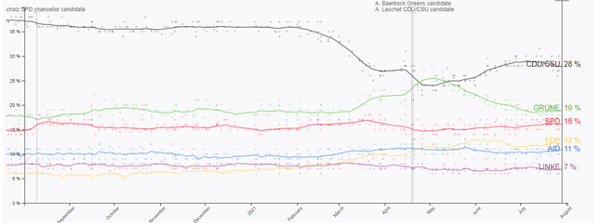
The veteran fundamental analyst and Head of Investment Research at BDSwiss Marshall Gittler has shared his insights, views and projections on the upcoming German Elections Report and its impact on the EUR forex pairs. As the German Elections are getting closer, traders are already attempting to identify the biggest potential winners and losers in the forex and EU stock markets.
German Election in the Focus
The German federal election will take place on Sep. 26th. This is the first such election in 16 years that won’t have Angela Merkel on the ballot. As Germany is the pivotal economy in Europe its future strongly influences the continent and the currency. So everyone wants to know if there will be a drastic change after 16 years under Merkel.
Due to specifics of the Germany’s electoral system, it is difficult for any one party to form a government on its own, meaning that coalition governments tend to be the rule.

The polls show the CDU/CSU is leading, but with the Greens, rather than the SPD, in second place. As usual, no party is likely to be in a position to govern by itself. The focus, therefore, is on what parties might form a coalition and how they need to compromise in a coalition that might affect their policies.

Currently, the only two-party coalition possible seems to be the CDU/CSU and the Greens (the so-called “black/green” coalition). Gittler believes that it is the most likely outcome of the election now.
According to Gittler, these two parties have similar views on infrastructure investment, social policies, and climate change, although the Greens are more aggressive on the latter issue. But there are also big differences in some of the aspects of the parties. The CDU/CSU doesn’t want any tax hikes and wants to keep the debt brake and balanced budget target, while the Greens on the other hand want a wealth tax, higher taxes for the top income earners, want to make the debt break more flexible, and support a common EU fiscal policy and reform of the SGP.

At the moment, US fiscal policy is making a bigger contribution to growth there than EU fiscal policy is, but in coming years as the US winds down its extraordinary policies and the EU’s NGEU fund continues to disburse funds, the EU’s fiscal contraction should be less acute than the US’. That may be one-factor supporting EUR/USD. If however, Germany goes back to ploughing the furrow of Teutonic rectitude, EU growth could slow and EUR/USD move still lower.
Visit bdswiss.group to access Marshall Gittler’s full German Elections Report and get a complete breakdown of what we can expect from the markets before and after the elections.